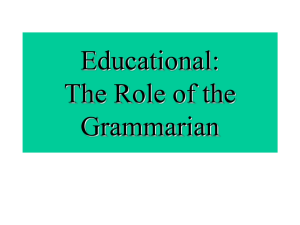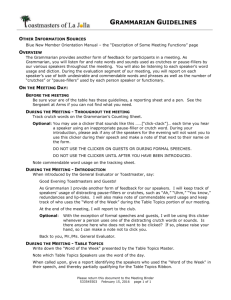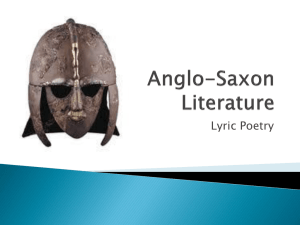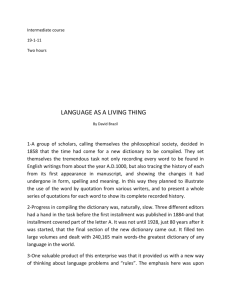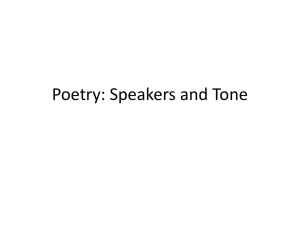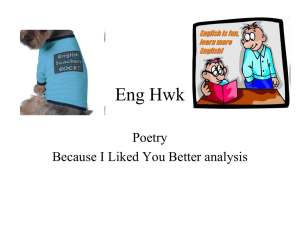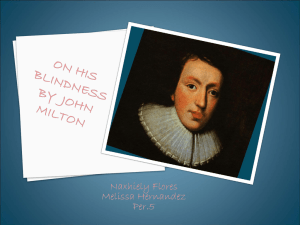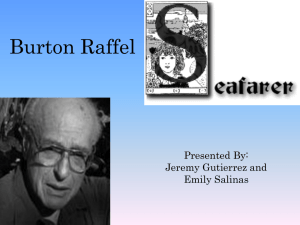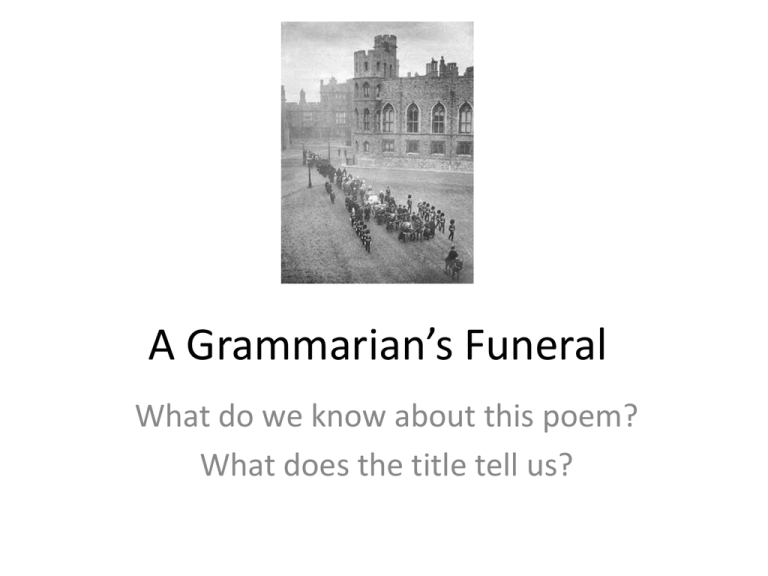
A Grammarian’s Funeral
What do we know about this poem?
What does the title tell us?
Context
Epigraph: “Shortly after the revival of learning in
Europe”
Set in c14th Italy, during the early Renaissance. The
Renaissance was marked by a revival of interest in
Greek and Latin learning, including the languages.
‘The Grammarian’ of the poem would have been a
scholar of the classical languages, instrumental in
the recovery of ancient texts (remember the brown
manuscripts from ‘Bishop’?). These grammarians
were the foundation of the Renaissance but were
often the butt of jokes and satirised.
This poem is about...
In this poem, the Grammarian’s former students
(one of which is the speaker) are performing his
eulogy and carrying his corpse to its burial place
atop a mountain.
The Grammarian has passed away after spending
his whole life in study. The poem is about his life,
as seen by the speaker (his disciple). He speaks as
they move the body from the plains to the
mountain-top.
Language and Imagery
Fields and villages of the
common folk
Small
radius
Let us begin and carry up this corpse,
Singing together.
Leave we the common crofts, the vulgar thorpes
Each in its tether
Sleeping safe on the bosom of the plain,
5
Cared-for till cock-crow:
Look out if yonder be not day again
The high land
Rimming the rock-row!
That's the appropriate country; there, man's thought,
Rarer, intenser,
10
Self-gathered for an outbreak, as it ought,
Chafes in the censer.
Struggles against restraint
Burial place
Are you
ready for
the signal?
Leave we the unlettered plain its herd and crop;
Seek we sepulture
On a tall mountain, citied to the top,
Crowded with culture!
All the peaks soar, but one the rest excels;
Clouds overcome it;
No! yonder sparkle is the citadel's
Circling its summit.
Thither our path lies; wind we up the heights:
Wait ye the warning?
Our low life was the level's and the night's;
He's for the morning.
Step to a tune, square chests, erect each head,
'Ware the beholders!
This is our master, famous, calm and dead,
Borne on our shoulders.
Be aware, the watchers!
15
20
25
Sleep, crop and herd! sleep, darkling thorpe and croft,
Safe from the weather!
30
He, whom we convoy to his grave aloft,
God of poetry; presented
Singing together,
as handsome
He was a man born with thy face and throat,
Lyric Apollo!
Long he lived nameless: how should spring take note
35
Winter would follow?
Till lo, the little touch, and youth was gone!
Cramped and diminished,
Moaned he, "New measures, other feet anon!
My dance is finished"?
40
No, that's the world's way: (keep the mountain-side,
Make for the city!)
He knew the signal, and stepped on with pride
Over men's pity;
Left play for work, and grappled with the world
Bent on escaping:
"What's in the scroll," quoth he, "thou keepest furled
Show me their shaping,
Theirs who most studied man, the bard and sage,-Give!"--So, he gowned him,
Straight got by heart that book to its last page:
Learned, we found him.
45
poet
Wise person
50
Became a scholar
Yea, but we found him bald too, eyes like lead,
Accents uncertain:
"Time to taste life," another would have said,
"Up with the curtain!"
The
This man said rather, "Actual life comes next?
commentary
Patience a moment!
Grant I have mastered learning's crabbed text,
Still there's the comment.
Let me know all! Prate not of most or least,
Painful or easy!
Even to the crumbs I'd fain eat up the feast,
Ay, nor feel queasy."
Oh, such a life as he resolved to live,
When he had learned it,
When he had gathered all books had to give!
Sooner, he spurned it.
structure
Image the whole, then execute the parts-Fancy the fabric
Quite, ere you build, ere steel strike fire from quartz,
Ere mortar dab brick!
55
60
65
70
Gallstones
or kidney
stones
(from ‘the
stone’,
used for
counting)
(Here's the town-gate reached: there's the market-place
Gaping before us.)
Yea, this in him was the peculiar grace
(Hearten our chorus!)
That before living he'd learn how to live-No end to learning:
Earn the means first--God surely will contrive
Use for our earning.
Others mistrust and say, "But time escapes:
Live now or never!"
He said, "What's time? Leave Now for dogs and apes!
Man has Forever."
Back to his book then: deeper drooped his head:
Calculus racked him:
Leaden before, his eyes grew dross of lead:
Tussis attacked him.
A cough
75
80
85
"Now, master, take a little rest!"--not he!
(Caution redoubled
Step two abreast, the way winds narrowly!)
Not a whit troubled,
Back to his studies, fresher than at first,
Fierce as a dragon
He (soul-hydroptic with a sacred thirst)
Sucked at the flagon.
Oh, if we draw a circle premature,
Heedless of far gain,
Greedy for quick returns of profit, sure
Bad is our bargain!
Was it not great? did not he throw on God,
(He loves the burthen)-God's task to make the heavenly period
Perfect the earthen?
Did not he magnify the mind, show clear
Just what it all meant?
He would not discount life, as fools do here,
Paid by instalment.
90
Unquenchable
thirst in his
soul
95
A pitcher
100
105
He ventured neck or nothing--heaven's success
Found, or earth's failure:
"Wilt thou trust death or not?" He answered "Yes:
Hence with life's pale lure!"
That low man seeks a little thing to do,
Sees it and does it:
This high man, with a great thing to pursue,
Dies ere he knows it.
That low man goes on adding one to one,
His hundred's soon hit:
This high man, aiming at a million,
Misses an unit.
That, has the world here--should he need the next,
Let the world mind him!
This, throws himself on God, and unperplexed
Seeking shall find him.
110
115
120
Greek articles which
present difficulty for
students: ‘Hoti’ = that;
‘Oun’ = then; ‘De’ =
towards.
Browning to Tennyson: “I wanted the Grammarian ‘dead from the waist
down’ to spend his last breath on the biggest of the littlenesses; such a
one is the ‘enclitic De’.”
So, with the throttling hands of death at strife,
Ground he at grammar;
Still, thro' the rattle, parts of speech were rife:
While he could stammer
He settled Hoti's business--let it be!-Properly based Oun-Gave us the doctrine of the enclitic De,
Dead from the waist down.
Well, here's the platform, here's the proper place:
Hail to your purlieus,
All ye highfliers of the feathered race,
Swallows and curlews!
125
130
135
Greek: word dependent for its
stress on the preceding word
Piece of land near a place;
the ‘usual haunt’
Here's the top-peak; the multitude below
Live, for they can, there:
This man decided not to Live but Know-Bury this man there?
Here--here's his place, where meteors shoot, clouds form,
Lightnings are loosened,
Stars come and go! Let joy break with the storm,
Peace let the dew send!
Lofty designs must close in like effects:
Loftily lying,
Leave him--still loftier than the world suspects,
Living and dying.
140
145
Imagery
• Mountain represents greatness and higher
thoughts; culture and learning
• Plains are meant for uncouth, unlearned
people (where the villagers sleep under
darkness – under ignorance)
• Distinction between ‘this’ and ‘that’, ‘low’ and
‘high’ etc.
Form
• Dramatic monologue – the speaker is a
member of the funeral procession and gives
high praise to his former master
• First person plural – he speaks on behalf of a
group
• Is he an objective speaker?
• Does the Grammarian evoke our admiration
or our pity?
Structure
• Rhyme: ababcdcdefef – adds to the sense of
marching; their footsteps match each others; some
words spelled the same but do not sound alike: e.g.
live/contrive (line 79). One can’t know all?
• Shifting metre (longer tetrameter (5); shorter
dimeter (2)) also matches this climb
• Parenthesis (brackets) hold commands from the
speaker; he is assuming the role of new master
• Capital letters to stress themes in poem: ‘Life’
‘Knowledge’ ‘Now’

